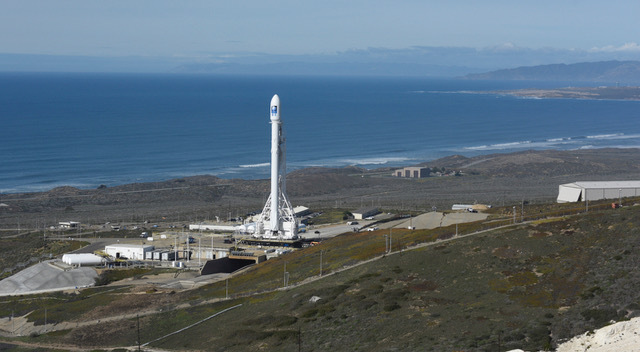Vandenberg Space Force Base Is Not Just a Name Change
Santa Barbara Supervisors Learn of a Massive Military-Commercial Development Scheme

SPACE IS THE PLACE: Maybe I’ve grown too old for my skin. When Vandenberg Air Force Base — located just a scenic hop up the coast–changed its name a month ago, it seriously creeped me out. For those missing the memo, it’s now called “Vandenberg Space Force Base.”
That’s right — a space force.
This reflects, I suppose, our growing need to dominate all of existence — into the infinity of space itself — so you and I can sleep peacefully in our beds at night. I’d suggest a sleeping pill instead. They’re cheaper. But they’re also habit-forming. And in the morning, you can never remember who you email-blasted the night before or why.
Which, of course, is the whole reason we need a space force in the morning.
When the matter came before the Board of Supervisors this Tuesday, my heebie-jeebies were set on quick twitch. They were allayed not at all by the space base’s new commander, Colonel Robert Long, who just flew in from the Pentagon to take charge of the base again. He’s been its commander twice before.
Long exuded warmth and competence in that deceptively low-key way common in people you never want to play poker with. “This is my home base,” Long purred professionally. “It’s wonderful to be back.” As if reading my mind, he proceeded to downplay the whole “space base” thing. “It’s just a name change,” he said.
I reached for my wallet to make sure it was still there.
And for good reason. The play before the supervisors was a hitch-your-wagon-to-the-stars economic development plan that would make the county’s emerging cannabis industry look like a street-corner lemonade stand. It was one part Buck Rogers, two parts Darth Vader, and about three parts P.T. Barnum, famous for his immortal formulation, “A sucker is born every second.”
Colonel Long made his strategic cameo and quickly left, replaced by Andrew Hackleman, a former Air Force officer best known for his recent effort to repurpose Pacific Gas and Electric’s Diablo Canyon Power Plant in Avila Beach, slated to close in a few years.
Every sixth word out of Hackleman’s mouth was “ecosystem,” as in “space ecosystem,” or “business ecosystem.” Clearly, it was selected for its soporific green-wash value. Hackleman emphasized the possibilities of “climate change data gathering,” for which Vandenberg — in actual fact — is ideally situated to become a world leader, if it isn’t already.
The proposal is that our county government teams up in some ill-defined fashion with UCSB, Cal Poly, NASA, the Department of Defense, and all the private money betting on outer space to grease the skids for a new public-private enterprise that will “rebrand” the Central Coast as the ultimate portal to military and commercial space launches on the planet.
Space, Hackleman breathlessly ejaculated, is an already $4 billion per year industry in a big fat hurry to hit the trillion-dollar mark.
Back in the 1980s, Vandenberg and Lompoc had similar dreams, but they went up in smoke when the Challenger space shuttle — and all astronauts on board — were blown up in a tragic catastrophe caused by the deployment of faulty O-rings.
Of such things, dreams are dashed.
In the late ’90s, Santa Barbara’s then-former Congressmember Andrea Seastrand tried to resurrect the dream by creating something called the California Space Authority. She was the wrong person for the job.
On one occasion, Seastrand blamed California’s fires, floods, and earthquakes on feminism, Wicca, and divorce. On another, she suggested space would be a good place to send poor kids trapped in the ghetto. In 2010, the Space Authority shut its doors having never achieved liftoff. And now this.
Obviously, space is the hot, trendy thing. China and the United States are duking it out over competing missions to Mars. The two richest men on the planet — Elon Musk and Jeff Bezos — have decided Earth is not big enough to contain their fortunes and are busily burning their bitcoins on their own private space race.
Musk, it should be noted, operates his SpaceX empire out of Vandenberg. And while Bezos is preparing for liftoff on an 11-minute rocket trip, it should be noted that his ex-wife, MacKenzie Scott, just donated $20 million to Santa Barbara City College and $15 million to Cal State Channel Islands. I’ll leave it to you to decide who’s getting more bang for her bucks. Thank you, MacKenzie.
None of this makes a lick of sense. When I was born, the planet had 2.8 billion people. Today, it’s 7.9 billion. To say the least, we have not realized the Boy Scout pledge to leave our campsite better than we found it. The carrying cost to the planet of these additional 5 billion people — and I’m one of ’em — hovers somewhere between the apocalyptic and the cataclysmic.
If there’s other intelligent life in outer space, they should regard our notions of colonizing other planets as an imminent and existential threat, and react accordingly.
And that, I suppose, is why we need a space force.
The supervisors, for the most part, listened politely. None expressed horror. Are they sentient beings? Supervisor Gregg Hart, ever practical and pragmatic, went small. He took issue with the marketing and branding strategy proposed by Hackleman.
Hackleman kept referring to the “Central Coast,” Hart noted. The “Central Coast’s” many universities, the “Central Coast’s” enticing environment, and all the ways the “Central Coast” would benefit. As a marketing tool, Hart objected, the term “Central Coast” was way too vague and generic. It’s specific to no place. Instead he explained, “The Santa Barbara brand is a global brand.”
I respectfully take issue with Colonel Long. It’s a whole lot more than a simple name change.
Support the Santa Barbara Independent through a long-term or a single contribution.



